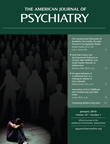Schizophrenia in the Offspring of Antenatally Depressed Mothers in the Northern Finland 1966 Birth Cohort: Relationship to Family History of Psychosis
Abstract
Objective
Maternal depression is relatively common during pregnancy. The authors examined whether maternal antenatal depressed mood increased the risk of schizophrenia and other psychoses among offspring with and without a familial history of psychosis.
Method
In the Northern Finland 1966 birth cohort, mothers of 12,058 children were asked at mid-gestation at the antenatal clinic if they felt depressed. The offspring were followed for over 30 years, and subsequent schizophrenia and other psychoses were detected using the Finnish Hospital Discharge Register, which was also used for identifying psychosis in the parents. Familial risk for psychosis was considered as a genetic risk factor and mothers' depressed mood as an environmental or genetic risk factor.
Results
The risk for schizophrenia was higher in the offspring with both maternal depressed mood during pregnancy and parental psychosis (OR=9.4, 95% CI=4.2–20.9 adjusted for sex and perinatal complications) than in those with a depressed mother but without parental psychosis (OR=1.0, 95% CI=0.6–1.8) or those without maternal depression and with a psychotic parent (OR=2.6, 95% CI=1.2–5.4). The reference group was birth cohort members without maternal antenatal depression and without parental psychosis.
Conclusions
Maternal depressed mood during pregnancy per se is unlikely to increase the risk for schizophrenia in the offspring but may affect subjects with a family history for psychosis. This finding could be an example of a gene-environment or possibly a gene-gene interaction in the development of schizophrenia. Mothers' antenatal depression may act as additive factor for subjects vulnerable to schizophrenia.



